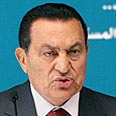
Egyptian President Hosni Mubarak said on Saturday he feared continued street demonstrations, especially if they became sectarian, could turn Lebanon into a battlefield.
On Friday hundreds of thousands of Hizbullah-led protesters rallied in Beirut to try to force the resignation of Prime Minister Fouad Siniora's US-backed government. The protest continued on Saturday.
"Wisdom is required in dealing with internal differences," Mubarak told journalists in Sharm el-Sheikh, where he was meeting with Russian Foreign Minister Sergei Lavrov.
"What I fear is that if the demonstrations continue, and take on a sectarian form, supporters of these sects from outside Lebanon will join in and no one will be able to control it, especially if it continues for a long time."
Mubarak, an ally of Washington in the Middle East, said he was worried outside forces could exacerbate the situation. "And the result will be a transformation of Lebanon into a battlefield that subjects it to danger," he said.
Hizbullah, Lebanon's most powerful Shi'ite Muslim group, and its pro-Syrian allies had called on Lebanese from across the country to take part in the protest in the capital Beirut, to be followed by an indefinite sit-in.
Hizbullah, which is backed by Syria and Iran, has branded the government a US puppet.
Hizbullah has been at loggerheads with Siniora's government over what it says was its failure to back the group during the July-August war with Israel.
Different takes on Lebanese unity
The US State Department pointed an accusing finger at Iran and Syria, claiming the two countries are trying to create instability in Lebanon. In a statement, State Department deputy spokesman Tom Casey highlighted the United States' support for the Siniora government.
Siniora spoke with Saudi Arabian King Abdullah bin Abdul Aziz, who also expressed his support for the existing Lebanese government. The king later spoke with members of the Lebanese cabinet, to reiterate these sentiments.
In addition, Jordan's King Abdullah called Siniora Friday to express his support for "the unity of Lebanon" and said he hoped that "the various political powers that operate in Lebanon do not destabilize the Lebanese society's unity."
Hizbullah and their political allies also claim to address the subject of unity, by demanding the establishment of a “national unity government” in which Shiite Muslims have at least one-third representation.
If such a government is installed, Hizbullah chief Hassan Nasrallah will have veto power on important issues facing the Lebanese government, as Lebanese law demands a majority of two-thirds to pass decisions – including the decision to topple the government.
As well, if one-third of lawmakers resign, the government automatically collapses.
Opposition members including Hizbullah, the Shiite Amal movement, and Michel Aoun loyalists, all agreed on an official name for their political camp Thursday; the National Lebanese Opposition Forces.
That was the name they would use in every protest operation which they said would “not stop until the demands, starting with a national unity government, are fulfilled.”















